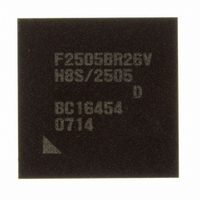DF2505BR26DV Renesas Electronics America, DF2505BR26DV Datasheet - Page 541

DF2505BR26DV
Manufacturer Part Number
DF2505BR26DV
Description
IC H8S/2505 MCU FLASH 176-LFBGA
Manufacturer
Renesas Electronics America
Series
H8® H8S/2500r
Specifications of DF2505BR26DV
Core Processor
H8S/2000
Core Size
16-Bit
Speed
26MHz
Connectivity
I²C, SCI
Peripherals
POR, PWM, WDT
Number Of I /o
104
Program Memory Size
384KB (384K x 8)
Program Memory Type
FLASH
Ram Size
32K x 8
Voltage - Supply (vcc/vdd)
3 V ~ 5.5 V
Data Converters
A/D 16x10b; D/A 2x8b
Oscillator Type
Internal
Operating Temperature
-40°C ~ 85°C
Package / Case
176-LFBGA
Lead Free Status / RoHS Status
Lead free / RoHS Compliant
Eeprom Size
-
Available stocks
Company
Part Number
Manufacturer
Quantity
Price
Company:
Part Number:
DF2505BR26DV
Manufacturer:
Renesas Electronics America
Quantity:
10 000
- Current page: 541 of 980
- Download datasheet (6Mb)
Legend:
S:
SLA:
R/W:
A:
DATA: Transfer data
P:
14.4.2
In master transmit mode, the master device outputs the transmit clock and transmit data, and the
slave device returns an acknowledge signal. For master transmit mode operation timing, see
figures 14.5 and 14.6. The transmission procedure and operations in master transmit mode are
described below.
1. Set the ICE bit in ICCR1 to 1. Set the MLS and WAIT bits in ICMR and the CKS3 to CKS0
2. Read the BBSY flag in ICCR2 to confirm that the bus is free. Set the MST and TRS bits in
3. After confirming that TDRE in ICSR has been set, write the transmit data (the first byte data
4. When transmission of one byte data is completed while TDRE is 1, TEND in ICSR is set to 1
5. The transmit data after the second byte is written to ICDRT every time TDRE is set.
6. Write the number of bytes to be transmitted to ICDRT. Wait until TEND is set (the end of last
7. When the STOP bit in ICSR is set to 1, the operation returns to the slave receive mode.
bits in ICCR1 to 1. (Initial setting)
ICCR1 to select master transmit mode. Then, write 1 to BBSY and 0 to SCP using MOV
instruction. (Start condition issued) This generates the start condition.
show the slave address and R/W) to ICDRT. At this time, TDRE is automatically cleared to 0,
and data is transferred from ICDRT to ICDRS. TDRE is set again.
at the rise of the 9th transmit clock pulse. Read the ACKBR bit in ICIER, and confirm that the
slave device has been selected. Then, write second byte data to ICDRT. When ACKBR is 1,
the slave device has not been acknowledged, so issue the stop condition. To issue the stop
condition, write 0 to BBSY and SCP using MOV instruction. SCL is fixed low until the
transmit data is prepared or the stop condition is issued.
byte data transmission) while TDRE is 1, or wait for NACK (NACKF in ICSR = 1) from the
receive device while ACKE in ICIER is 1. Then, issue the stop condition to clear TEND or
NACKF.
Start condition. The master device drives SDA from high to low while SCL is high.
Slave address
Indicates the direction of data transfer: from the slave device to the master device when
Acknowledge. The receive device drives SDA to low.
Stop condition. The master device drives SDA from low to high while SCL is high.
Master Transmit Operation
R/W is 1, or from the master device to the slave device when R/W is 0.
Rev. 6.00 Sep. 24, 2009 Page 493 of 928
Section 14 I
2
C Bus Interface 2 (IIC2)
REJ09B0099-0600
Related parts for DF2505BR26DV
Image
Part Number
Description
Manufacturer
Datasheet
Request
R

Part Number:
Description:
KIT STARTER FOR M16C/29
Manufacturer:
Renesas Electronics America
Datasheet:

Part Number:
Description:
KIT STARTER FOR R8C/2D
Manufacturer:
Renesas Electronics America
Datasheet:

Part Number:
Description:
R0K33062P STARTER KIT
Manufacturer:
Renesas Electronics America
Datasheet:

Part Number:
Description:
KIT STARTER FOR R8C/23 E8A
Manufacturer:
Renesas Electronics America
Datasheet:

Part Number:
Description:
KIT STARTER FOR R8C/25
Manufacturer:
Renesas Electronics America
Datasheet:

Part Number:
Description:
KIT STARTER H8S2456 SHARPE DSPLY
Manufacturer:
Renesas Electronics America
Datasheet:

Part Number:
Description:
KIT STARTER FOR R8C38C
Manufacturer:
Renesas Electronics America
Datasheet:

Part Number:
Description:
KIT STARTER FOR R8C35C
Manufacturer:
Renesas Electronics America
Datasheet:

Part Number:
Description:
KIT STARTER FOR R8CL3AC+LCD APPS
Manufacturer:
Renesas Electronics America
Datasheet:

Part Number:
Description:
KIT STARTER FOR RX610
Manufacturer:
Renesas Electronics America
Datasheet:

Part Number:
Description:
KIT STARTER FOR R32C/118
Manufacturer:
Renesas Electronics America
Datasheet:

Part Number:
Description:
KIT DEV RSK-R8C/26-29
Manufacturer:
Renesas Electronics America
Datasheet:

Part Number:
Description:
KIT STARTER FOR SH7124
Manufacturer:
Renesas Electronics America
Datasheet:

Part Number:
Description:
KIT STARTER FOR H8SX/1622
Manufacturer:
Renesas Electronics America
Datasheet:

Part Number:
Description:
KIT DEV FOR SH7203
Manufacturer:
Renesas Electronics America
Datasheet:











